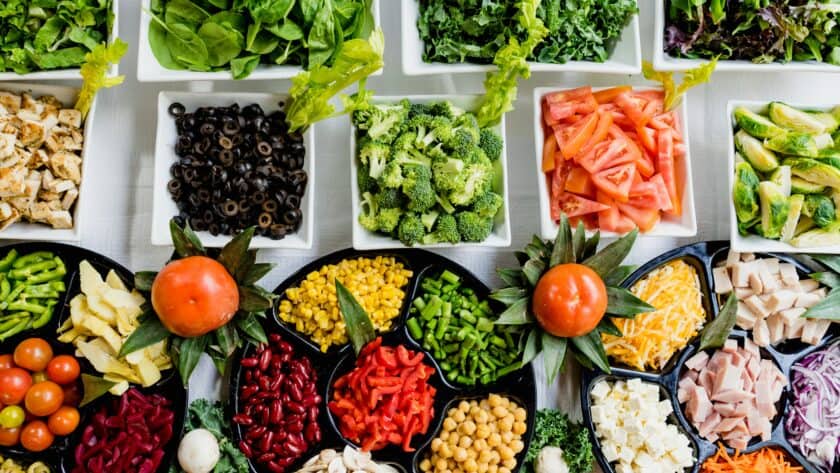Are you thinking of starting a keto diet? It can be overwhelming to think about which foods are right for this low-carb, high-fat lifestyle. That’s why we’ve made the ultimate keto food list with all the foods you need to start your keto journey.
Understanding the Keto Diet
Before diving into the food list, let’s take a moment to understand what the keto diet is all about.
The ketogenic diet, commonly known as the keto diet, is a low-carb, high-fat diet that forces your body into a state of ketosis. This kind of state makes your body’s fuel source from glucose (sugar) to ketones (fat) for energy.
When you consume a high-carb diet, your body produces glucose and insulin. Glucose is the easiest molecule for your body to convert and use as energy, so it will be chosen over any other energy source. Insulin is produced to process the glucose in your bloodstream by taking it around the body.
However, when you lower your carb intake, your body is forced to find a new energy source. Instead of glucose, your body starts breaking down stored fat into molecules called ketone bodies to use for energy. This kind of state is called ketosis.
Benefits of the Keto Diet
The keto diet has been gaining popularity over the years due to its various health benefits. One of the most significant benefits is weight loss. By eating less carb, you decrease your body’s insulin levels, which helps your body burn stored fat for energy instead of glucose. Additionally, the high-fat content of the diet helps you feel full for longer periods, reducing your overall calorie intake.
The keto diet has also been shown to improve blood sugar control. By eating fewer carbs, you decrease the amount of glucose in your bloodstream, which can help manage and prevent type 2 diabetes.
Another benefit of the keto diet is increased energy levels. When your body is in a state of ketosis, it is using fat for energy instead of glucose. Fat is a more efficient fuel source, providing a longer and more stable source of energy.
How to Get Started on the Keto Diet
Starting a keto diet may seem alarming, but it’s relatively simple. The first step is to calculate your macronutrient needs: 70-80% of calories from fat, 20-25% from protein, and 5-10% from carbs.
Once you have calculated your macronutrient needs, you can start planning your meals. Focus on high-fat foods such as avocados, nuts, and fatty meats. Protein should be consumed in moderation, and carbs should be limited to non-starchy vegetables such as leafy greens and cauliflower.
It’s important to stay hydrated on the keto diet, as it can be dehydrating. Drink plenty of water and consider adding electrolytes to your diet to maintain proper hydration levels.
Remember, the keto diet is not for everyone, and it’s always best to consult a healthcare professional before starting any new diet or exercise program.
Essential Keto Foods
Now, let’s dive into the foods that are important for a successful keto diet. While it may seem overwhelming at first, with a little bit of planning and preparation, you can easily incorporate these foods into your daily meals and snacks.
Healthy Fats
Healthy fats are a crucial component of a keto diet. Not only do they help keep you feeling full and satisfied, but they also provide your body with the energy it needs to function properly. These include avocado, coconut oil, olive oil, and grass-fed butter.
Avocado is a keto superstar because it is low in carbs and high in healthy fats, fiber, vitamins, and minerals. Plus, it’s incredibly versatile and can be used in everything from smoothies to salads to guacamole.
Coconut oil contains medium-chain triglycerides (MCTs), quickly converted into ketones for energy. This makes it an excellent choice for cooking and baking, as it can withstand high heat without breaking down.
Olive oil is rich in fats, which have been shown to reduce inflammation and improve cholesterol levels. It’s perfect for drizzling over salads or roasting vegetables.
Grass-fed butter is a good source of healthy saturated fats and vitamin K2, which is important for bone health. It’s also incredibly flavorful and can be used in everything from cooking to baking to spreading on your favorite keto-friendly bread.
Protein Sources
Protein is important for building and maintaining lean muscle mass on a keto diet. The best keto-friendly protein sources include beef, chicken, pork, fish, eggs, and low-carb protein powder.
Beef is a great source of high-quality protein and healthy fats, especially if it’s grass-fed and pasture-raised. It’s also incredibly versatile and can be used in everything from burgers to stews to stir-fries.
Chicken and pork are also excellent protein sources, but make sure to opt for organic and pasture-raised to avoid harmful chemicals. They can be roasted, grilled, or sautéed and used in a variety of dishes.
When it comes to fish, salmon is an excellent source of protein and omega-3 fatty acids. It’s also incredibly flavorful and can be baked, grilled, or pan-seared for a delicious meal.
Eggs are an easy and versatile protein source that can be cooked in various ways. Whether you prefer them scrambled, fried, or boiled, they’re a great addition to any keto meal.
Low-carb protein powder can be added to smoothies or used to make protein bars or snacks. Look for options that are low in carbs and free from artificial sweeteners and additives.
Low-Carb Vegetables
Vegetables are an important part of a keto diet because they provide important vitamins, minerals, and fiber while keeping carb intake low. Examples of keto-friendly vegetables include spinach, broccoli, cauliflower, zucchini, and asparagus.
Spinach is a leafy green that is low in carbs and high in nutrients like vitamin A and iron. It’s perfect for adding to salads or sautéing as a side dish.
Broccoli is another potent cruciferous vegetable that is packed with fiber, vitamins, and antioxidants. It can be roasted, steamed, or stir-fried for a delicious and nutritious meal.
Cauliflower is a versatile vegetable that can be used as a substitute for rice or mashed potatoes. It can also be roasted, grilled, or sautéed for a delicious side dish or main course.
Zucchini is a low-carb veggie that can be spiralized or grilled. It’s perfect for making keto-friendly noodles or adding to stir-fries and salads.
Asparagus is high in fiber and contains antioxidants like glutathione. It can be roasted, grilled, or sautéed and makes a delicious side dish or addition to omelets and frittatas.
Dairy Products
Dairy products can be a source of important nutrients and healthy fats on a keto diet. However, it’s important to choose full-fat and unprocessed options. Examples of keto-friendly dairy products include cheese, yogurt, and heavy cream.
Cheese is a great source of calcium and protein, but make sure to opt for hard, aged cheese as they are typically lower in lactose. Parmesan, cheddar, and gouda are all great options.
Yogurt can be a healthy snack if it is unsweetened and full-fat. Look for options that are free from added sugars and artificial flavors and preservatives.
Heavy cream is a high-fat dairy product that can be added to coffee or used in keto-friendly recipes like sauces and dips. It’s also a great option for making homemade ice cream or whipped cream.
Nuts and Seeds
Nuts and seeds are an excellent source of healthy fats, fiber, and minerals. They’re also incredibly versatile and can be used in a variety of keto-friendly recipes. Examples of keto-friendly nuts and seeds include almonds, macadamia nuts, chia seeds, and flaxseeds.
Almonds are rich in vitamin E and can lower LDL cholesterol levels. They’re perfect for snacking on or adding to salads and baked goods.
Macadamia nuts are high in monounsaturated fats and have been shown to improve heart health. They’re perfect for snacking on or adding to keto-friendly desserts.
Chia seeds and flaxseeds are packed with fiber and healthy omega-3 fats. They can be added to smoothies, yogurt, or used in baked goods as a low-carb substitute for flour.
By mixing these important keto foods into your daily diet, you’ll be on your way to achieving your health and fitness goals. Remember to focus on whole, unprocessed foods and listen to your body’s hunger and fullness cues to ensure you’re getting the nutrients you need while staying in ketosis.
Keto-Friendly Beverages
Staying hydrated on a keto diet is important, and there are several beverages to choose from.
Water and Electrolytes
Water should be your go-to beverage on a keto diet. It’s important to drink at least 8-10 cups of water per day to avoid dehydration.
Electrolytes are important on a keto diet as low-carb diets can cause electrolyte imbalances. Magnesium, potassium, and sodium are the most important electrolytes to supplement a keto diet. Adding a pinch of sea salt to your water or consuming an electrolyte drink can help replenish these electrolytes.
Coffee and Tea
Coffee and tea are beverages that can provide a boost of energy and antioxidants. However, make sure to avoid adding sugar or milk to your coffee as it can increase carb intake.
Bone Broth
Bone broth is a nutrient-dense beverage that is rich in collagen, amino acids, and minerals. It’s also an excellent source of electrolytes, making it a suitable option for staying hydrated on a keto diet.
Low-Carb Smoothies
Smoothies can be a healthy and easy option on a keto diet. Using low-carb fruits like berries, adding healthy fats like avocado or coconut oil, and using low-carb protein powder can make a delicious and filling smoothie.
In conclusion, the ultimate keto food list consists of healthy fats, protein sources, low-carb veggies, dairy products, nuts and seeds, and beverages. Understanding the keto diet and including these foods in your diet can help you achieve your health goals and improve your overall well-being.
“The information provided on this website is intended for general informational purposes only and should not be considered as medical advice. It is important to always consult with a qualified healthcare professional regarding any medical conditions, symptoms, or concerns you may have. This website does not provide medical diagnosis, treatment, or advice, and reliance on any information provided on this site is solely at your own risk.”




